- Home
- Ian McDonald
Time Was Page 3
Time Was Read online
Page 3
Emotions have no definition other than themselves. They are irreducible, the atoms of sensation. All written art is an attempt to communicate what it is to feel, to ask the terrifying question: Is what I experience in my head the same as what you experience? Terrifying because we can never know for certain. We hope; we risk.
My hopeful, fearful little English heart is in smithereens.
I know who you are now. The Receiver Block women are superlative gossips. New men on the base. Ben Seligman. A man in white, a boffin. A doctor of physics, from Caius College, Cambridge, but your people are from Manchester, generations deep. I hear only the northern richness of your accent as I pass Boffins Corner: Ruby, another Lancastrian, pinpointed your accent. You’ve never spoken to me in it. But you’ve looked, and you look and we catch each other’s eyes and hold for that safe moment.
I think it’s a kind of radar. You can’t see it, can’t hear it; it doesn’t touch any of our senses and all it returns are ghosts, but from those ghosts we can work out a heading, an orientation.
Autumn arrived in tumbled weather fronts and a sense of meteorological safety: no invasion this season. I migrated indoors. In Poets Corner I hide behind my beer and plan a hundred love poems to you, none of which I dare ever publish, none of which I can ever complete.
And I look up and you are there in front of me, your face awkward, your feet clumsy, and you set the pint in front of me.
“Do you take bribes?”
Oh God say something shape words utter coherencies.
I smile and nod.
“You’re Tom Chappell, aren’t you?”
“I am.”
“Tom the Rhymer.”
I hear him capitalize it. It’s gone quiet in the Receiver Block snug.
I make a stupid apologetic half smile, half dip of the head.
He extends a hand.
“Ben Seligman.”
I know that.
His hand is hot. Nerves. Mine is admirably cool from the pint.
“I was wondering. I’ve got myself involved in the base pantomime. I know, I didn’t move quickly enough. I’m running the lights, but I need someone to help with the other technical stuff; sound effects, rigging, all that. I hear you know a bit about it.”
I know no such things.
“If you’ve got the time, I’d appreciate a hand.”
Our eyes touch.
“Yes,” I say. “Happy to oblige.”
And he smiles and bites back the smile for fear of it shining too bright, and clumsily, apologetically, awkwardly he makes his way back to Boffins Corner. He nods to me again and smiles as they rise from their table to make their beery way back to base: he has an excuse now. I wait for the radar girls to pile from the back room in a pall of cigarette smoke.
“Lizzie.”
She hangs back in the doorway.
“Did you tell him I knew about stage lighting?”
“I thought you did,” she says. “Sorry if I got you into trouble. You can always tell him no.”
“It would be a shame to let him down.”
“It would that.”
* * *
He blows me during Nurse Bedpan’s “Oh no, he isn’t; oh yes, he is” routine. Captain McTavish is out on the stage in the full Grande Dame wig and pancake makeup, batting banter and badinage back and forth with the front rows. I’m on the follow spot keeping him lit while in the shadows the stage crew dress the set for the Robin Hood Silver Arrow Scene when I first feel arms around my waist, then the movement of a hand down, and an unzip and a hand cupping me, then a tongue working its magic.
I manage to whisper a protest about the danger the danger, but he takes his lips away for a moment to whisper back, “No one will see. They’re blind in this light.”
The lighting gantry in Bawdsey Village Hall is the size of a large wardrobe, the heat from the rheostats like a blast furnace, put a hand wrong you electrocute yourself and directly beneath my feet Robin Hood and his Merry Men are waiting for the cue from the stage manager and Ben is blowing me brilliantly, beautifully, dirtily. Evil evil boy: if I waver, if the spot drifts for an instant, Captain McTavish will have me on jankers for a week. Two hundred kids, evacuees, locals, RAF and the clergy of St. Mary’s roar with laughter to the Dame as Ben finishes me by hand, wipes me off, does me up and is up at the rheostats to light the entrance of the singing, prancing Merry Men.
There are five curtain calls. All in all, opening night of RAF Bawdsey’s panto Babes in the Wood is a thundering success.
Lambeth
I saw her come down the platform towards the barrier and started waving. There is something about London mainline stations that makes all partings and meetings cinematic. She grinned broadly. I had never seen her smile before.
I took her backpack and we went to drop her stuff off at the Premier Inn. I fidgeted in the lobby while Thorn took an age to settle herself. I was excited that Thorn had come up to London. She hadn’t been in London for fifteen years. There was so much I wanted to show her. I was excited about our appointment with Shahrzad at the Imperial War Museum. I had e-mailed her my photographs and then assumed she had forgotten about them. Since I first met her at the acquittal party following a literary forgery case and seen her extraordinary abilities, I have called on her talents occasionally and learned to work with her timetable and calendar, or not at all. When Shahrzad e-mailed me five days later to let me know she had something interesting, I knew it was more than just that.
The Imperial War Museum was a ten-minute walk across Geraldine Mary Harmsworth Park to the All Saints Annexe where the photographic collection was stored.
“So, you said talent?” Thorn asked. Her hands were thrust deep in pockets, her scarf pulled tight. The park was layered and fragrant with late autumn leaves, swept into crisp drifts by a stiffening westerly wind. Voices called from the soccer pitches for the ball, for a pass.
“Shahrzad is a super-recognizer,” I said. “Pretty useful for a photo archivist. Most of them work for the police. They can spot someone in CCTV footage and remember that they’ve seen that face before, even if it was years ago, and where and when. The Met’s asked her to work for them, but she doesn’t view the police as friends. Her family escaped from Iran in 1979 and there was always someone watching, either the police or the Iranian Embassy. But you must never call her Iranian. She’s Persian.”
We left coats and bags and picked up our passes.
“It’s ‘Hildreth’ with an e, not ‘Hildrith’ with an i,” Thorn hissed as the intern took us up to the viewing room.
Shahrzad was late. Shahrzad was early by Shahrzad time. Just as I was about to text her the door burst open and a short, solid woman in her midforties stormed into the Visitors’ Room in a flurry of scarves and sleeves. She banged boxes and files and her handbag down on the table. Her face was a mask of fury.
“Fucking Charlie Greenall. Fucking middle-micro-wank-management. Fucking team meetings. What the fuck gets done in meetings anyway? How are you, Emmett?” Her face lit up like sun breaking through a storm. Shahrzad was one of those people whose natural demeanor is naturally glowering but whose smile, rare and always earned, was radiant as a saint. Before I could answer, she said, “You must be Thorn, yes?” Her handshake was as intimidating as her countenance. Thorn did not wince, though I saw bones shift under her skin. “Thirtieth letter of the Icelandic alphabet.” She spread her folders out on the table and we sat.
“Thank you for sending this to me, Emmett. It entertained me greatly.” She turned her heavily mascaraed eyes on Thorn and her face settled into storm again. “Have you thought of donating all this stuff to us? Rural attics, darling, no. Rats, mice. Pigeon shit. Fire. Flood. Darling, in ten years’ time, when climate change has wreaked its fearful work upon us, the North Sea’s going to run as far as fucking Cambridge. Your little plastic boxes will be bobbing, darling. Bobbing. The amount of priceless material that gets ruined by well-intentioned amateurs: Have you any idea the damage something as s
imple as seasonal temperature variations is doing to your great-grandfather’s archive? Of course you don’t. You need the Seven Ps. Professional Paper Preservation Protects Perfect Precious Pictures. Photographs are like children, sweetie. You care for them, you nurture them, you love, but one day, well, you just have to let them go.
“Now, the material.” She laid out printouts of the documents I had sent her. “Emmett, your letter. Pretty boys have a lovely time in Alexandria. It’s wartime, everyone’s at it like knives, seen it before. Thorn, your great-grandfather is as nasty a little bigoted shit as I never care to meet again. This, however.” She tapped the photographs at the pyramids. “This I can work with. This exercises my grey matter. I see this and I think, ‘Hello, boys, I know you from somewhere, don’t I?’ And it transpires that I did.”
She slipped a printout, facedown, from a folder and turned it up. A country pub, red tiled, low windowed; a cart, shafts up; arranged against it, soldier boys. Arms folded, leaning nonchalantly, looking into the camera. Battle dress open at the collar, necks burned from the plowing, puttees neatly wound around farm-boy calves. No weapons, no hats, no identifying badges, moustached all. First World War recruits before the embarkation, an image from a murdered England. Boys, friends all. I could see that from their easy familiarity: Here were young men who had grown up together. A pals regiment.
“Here.” I spotted them the instant before Shahrzad’s finger descended. The dark-haired man with his arm around the towheaded man’s shoulder, each of them looking into the lens with an expression deeper than pride and adventure. Here were knowing, experience, dread. Thorn let out a small gasp of wonder.
“The picture was taken on the twenty-eighth of July 1915,” Shahrzad said. “The pub is The Rose and Crown, Snettisham.”
“Snettisham, that’s near . . . ,” I said.
“Sandringham.”
“The Sandringham Pals,” I said.
“Sorry?” Thorn said.
“Lord Kitchener’s war strategy was based on a constant stream of fresh bodies to overwhelm the enemy,” Shahrzad said. “Conscription was an alien notion in the British army, which had always been professional; so to sugar the pill, groups that enlisted in the same place served together. Pals battalions. There were works battalions, three football team battalions, even a Stockbrokers’ Battalion. The Sandringham Pals were all workers on the royal estate.”
“The Fifth Norfolks,” I said. “The Vanished Regiment.”
Shahrzad nodded.
“Explain?” Thorn asked.
“Two days later the Sandringham Pals were amalgamated into the Fifth Norfolk Regiment and shipped out from Liverpool to the Dardanelles. The Fifth Norfolks were part of the Hundred - and - Sixty - Third Brigade—here’s how it works, sweetie. Very roughly: One hundred men, a battalion. One thousand men, a regiment. Two thousand men, a brigade. Ten thousand men, a division. They landed at Suvla Bay on August tenth. Two days later the One - Hundred - and - Sixty-Third was sent into action to dislodge Turkish positions on the Anafarta Plain. They marched into sheer fucking hell. They were criminally under-prepared. They were over-dressed for the heat of Turkey in August. They had rubbish arms, poor provisions, and they were ordered to advance in broad daylight into well-prepared Ottoman defenses, dug in deep on the Kavak Tepe hill. They managed to push the Ottomans back into a forest set ablaze by artillery fire. They advanced up into the smoke and flame and that was the last anyone ever saw of them, disappearing into the smoke. The Vanished Battalion.”
“God,” Thorn said. “What happened?”
“The archaeology suggests a massacre,” Shahrzad said. “The Ottomans executed all their prisoners.”
“There is another theory,” I ventured.
“The MJ-Twelve account is nonsense,” Shahrzad said with heat.
“The New Zealand Army Corps signed sworn statements that they had seen six to eight lenticular-shaped clouds over Kavak Tepe,” I said.
“Reichardt didn’t come forward with that account until 1965,” Shahrzad said. She slipped photocopies out of another folder. “And he says that no explanation can be found in the historical records of the Imperial War Museum’s archives. Shahrzad Hejazi says there’s a lot more in the archives than we’re telling, sweetie. This stays in the building. And if I ever hear whisper of this, Emmett Leigh, you will end your days selling blow jobs to bookdealers.” One piece of paper, facedown of course, to Thorn, one to me. “This is what the Anzacs really saw. Now, milk in coffee? Sugar?”
August 11th
My dearest Mamaji,
A few short lines, written in fierce haste, for soon I shall see action again and with my whole heart I dread it.
I have been posted away from the Australians, for which I was at first grateful, for, as you know from my previous letters, I found their customary roughness, their excessive mannishness, uncongenial. I have been seconded to an English brigade, where I will be serving not with my brother muleteers, but as a stretcher-bearer, which suits my disposition and spiritual demeanour better. Mamaji: these English! We are taught to consider them our betters, but whereas the Australians accepted me as a man, if effete by their lights, these Anglians do not see me as human at all. I will not offend your sensibilities, my dear Mama, with the names and sobriquets they afflict on me.
I have met a few agreeable types. There is a corporal, quite ill, a brother poet. We have agreed to read and critique each other’s work. I wonder if he realises what he has let himself in for! Fortunate for him that I have not written a word since shipping out from Egypt, else the pile of papers would be insurmountable. Urdu is everywhere acknowledged the true language of poetry, and yet I find the words elude me; they slip from the folds of mind even as the image is formed. Mute visions. I am dry of poetry. The corporal’s work is passable, if leaden, in both weight and lustre, and I struggle to bring myself to read it.
The corporal has a close friend, dark as he is fair. Both of them are oddities among the dull yeomanry of the Sandringhams. Everything about them is out of place: their accents, their breadth of experience, their age—these are mature men, leading eager, dull boys—their worldliness. I would call them old souls. You say I have an eye for where the worlds met, Mamaji: these two men, inseparable friends, seem to me to have rinsed through many lives, many turns. The other ranks seem to believe that if they are with them, they are somehow protected. They are admirable company, fine conversationalists and well schooled in the sciences and the arts, though not, alas, in the magnificent culture and history of my own land. We share tea and poetry—the corporal carries a small volume of verse next to his heart—and listen to the guns. The eternal guns.
Those guns were busy again this night. There is to be a push. There is always a push, and a push back, and again a push forward: a few footsteps over these hillsides veined with trenches, so close we can smell the Turkish cigarettes. The trenches talk of glory, but all I see is breakage and the waste. I carry it back to the lines on my stretcher.
Your devoted son,
Amal
* * *
August 12th
My dearest Mamaji,
I trust this finds you, and yet I trust that it does not. Post has been suspended, so I have secreted my letters to you, my fragrant mother, in my pocket book in the hope that, should the worst befall, they might find you with my other personal effects.
With first light the guns fell silent. Soon the whistles would sound and trenches give up their bodies like an obscene parody of the Christian resurrection. I had just shared a light with my two friends, Seligman and Chappell, when we heard a new sound. Not the guns, not their echo across that blasted hillside, something new and otherworldly. The best I can describe, it was like one of the dry season storms that rolls in from the Deccan, that the old Sufis call the Hammer of God. The stuff of legends and childhood terrors.
At once Seligman and Chappell left off their smoke with me. They pushed a periscope up over the top of the trench, then, without so much as a word
, they put up a scaling ladder and ran up it, Seligman leading Chappell by the hand like a mother leading a child to the well. It was as if, deep in that strange thunder, something had spoken their names. By now the battalion was awake and wide-eyed with alarm, but before anyone could stop them they were into No Man’s Land.
As one we rushed to the parapet. We looked into fiery hell, such as the Christians and Buddhists relish: a ball of darkness, flickering with light, like lightning tied in a knot. Silhouetted against this blazing backdrop, the crouching figures of Seligman and Chappell hastened from shell hole to shell hole, trench to abandoned trench, as the Ottomans opened up.
“At them, lads!” our officers cried, and we returned fire, but ineffectually and with bafflement, for we saw that as my friends moved towards the storm, it moved towards them. A hot wind blew in our faces. I thought I imagined strange voices on it: cries, implorings, laughter, and saw from the faces of the soldiers that I was not alone.
Seligman and Chappell ran towards this cloud. Our Lieutenant shouted their names, twice, reached for his service revolver, then snapped the holster shut on it again. I saw the cloud open to receive them. I saw the lightning part, and them go up into it, hand in hand like children. Then the cloud closed and the thunder ceased and the hot wind and the things that spoke in it fell still. Before our astonished eyes, the cloud vanished into itself. Folded inwards, and was gone, and Seligman and Chappell with it.
Why, in the midst of such immense horror, in the middle of a push, do I dwell on this strange incident? Perhaps because it is an indicative madness, the insanity that reveals the greater insanity. Everything we know and trust is broken here; we deal in outrages, so is it so strange if nature outrages itself, and us?
Moments after, the whistles blew. Dawn had come, and we must rise and fight. Did we dream what we saw? Was it a collective nightmare, forged in the insanity of war? The whistles sounded; with a cheer the Sandringham Pals rose up and went over the top. And I sat, awaiting my call to go and bring what remains of them back, writing to you, my dearest Mamaji.

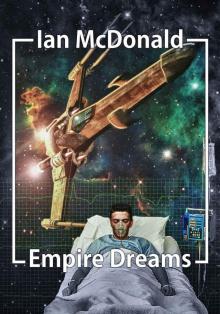 Empire Dreams
Empire Dreams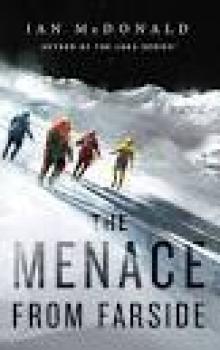 The Menace from Farside
The Menace from Farside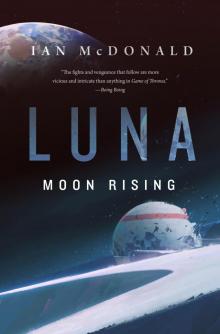 Luna: Moon Rising
Luna: Moon Rising Moon Rising
Moon Rising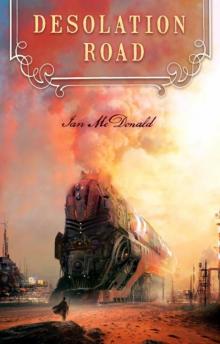 Desolation Road dru-1
Desolation Road dru-1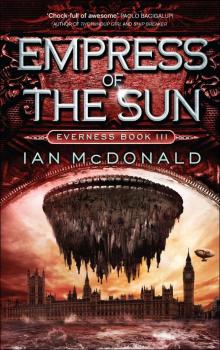 Empress of the Sun
Empress of the Sun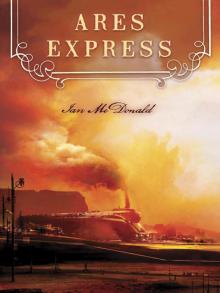 Ares Express dru-2
Ares Express dru-2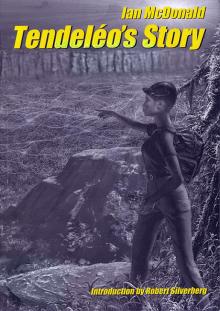 Tendeléo’s Story
Tendeléo’s Story River Of Gods
River Of Gods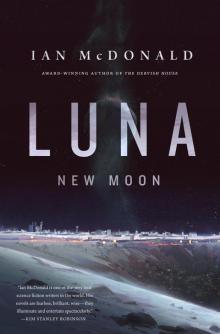 Luna
Luna![Cyberabad Days - [River of Gods 02] Read online](http://i1.bookreadfree.com/i1/03/29/cyberabad_days_-_river_of_gods_02_preview.jpg) Cyberabad Days - [River of Gods 02]
Cyberabad Days - [River of Gods 02]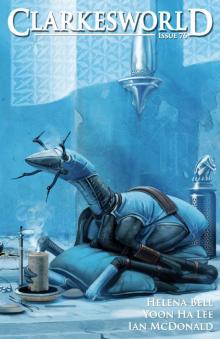 Clarkesworld Magazine Issue 76
Clarkesworld Magazine Issue 76 Brasyl (GollanczF.)
Brasyl (GollanczF.)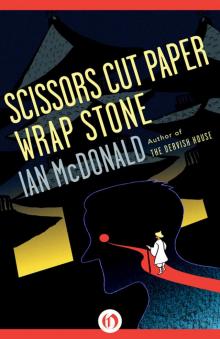 Scissors Cut Paper Wrap Stone
Scissors Cut Paper Wrap Stone Chaga
Chaga Time Was
Time Was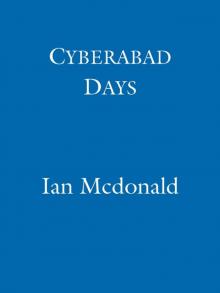 Cyberabad Days
Cyberabad Days Be My Enemy
Be My Enemy Changa
Changa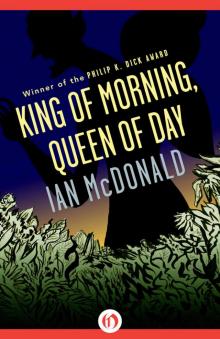 King of Morning, Queen of Day
King of Morning, Queen of Day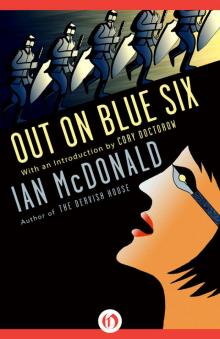 Out on Blue Six
Out on Blue Six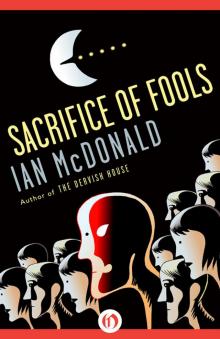 Sacrifice of Fools
Sacrifice of Fools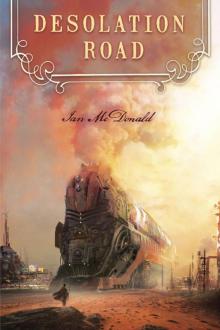 Desolation Road
Desolation Road Luna--Wolf Moon--A Novel
Luna--Wolf Moon--A Novel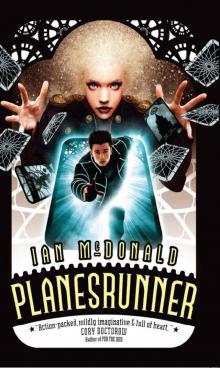 Planesrunner (Everness Book One)
Planesrunner (Everness Book One)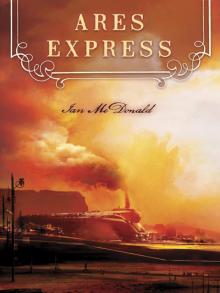 Ares Express
Ares Express